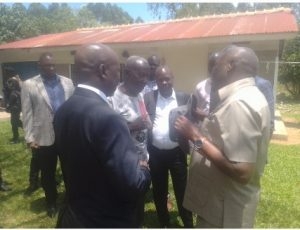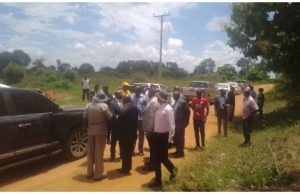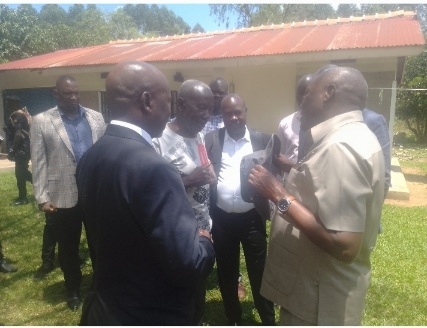By Steven Enatu.
Residents of Serere District are urging the Ministry of Energy and Mineral Development to expand electricity access beyond roadside centers and homes. Their concerns were voiced on Friday, October 11, 2024, at Kateta Sub County during the launch of the Ochapa-Kateta line, part of the Accelerated Rural Electrification Project funded by a World Bank loan. The event was attended by Sidronius Okasai Opolot, the State Minister for Energy, and local district leaders.

Under this project, the government is constructing medium and low-voltage networks, installing poles, mounting transformers, and providing last-mile electricity connections for consumers. Despite this progress, many residents express frustration over the lack of power access to their homes.
Teddy Ageata, a resident of Oburekor village in Orupe Parish, lamented, “We were told to wire our houses, which we did, but up to now, we have no hope of getting power. Our wish is to have electricity connected to our homes, but there is not a single pole near us.” She emphasized the importance of electricity for lighting and household appliances like refrigerators.
Michael Opolot, the local council chairperson of Omagara village, highlighted the disparity in power access, stating, “Our village has 472 households, but only those within the trading centers along the power lines have been connected. This goes against the wishes of the people who need power at the grassroots level.”
Christopher Opio, the local council chairperson of Katete Parish, echoed these sentiments, noting that only houses within the centers are connected to power lines. He urged that the entire community deserves access to electricity, especially schools and health centers.
Several residents underscored the significance of electricity for community transformation. Max Opolot from Awiny Agule Parish expressed optimism about the Ochapa-Kateta line, recalling how the power previously connected in his center of Olagara had boosted trade before it was disconnected. “We need the ministry to connect power beyond Olagara center to cover other areas and schools,” he urged.
Residents also spoke about the potential of electricity to foster small businesses and job creation. Access to power would enable activities such as metal fabrication and salons, allowing community members to improve their livelihoods. “With power, we could drink cold beverages, and children would be able to read at night,” one resident noted.
The area’s Member of Parliament, Emmanuel Omoding, stressed the importance of the Rural Electrification Program in alleviating poverty. “I am committed to advocating for equitable access to electricity for all communities, including my home sub-county, Olio, which is still in the dark,” he said. Omoding lamented the lack of power in his area, despite the presence of power poles.
Eng. Abdon Atwine, commissioner of the Rural Electrification Program, acknowledged existing service gaps but assured residents that efforts are underway to include unconnected villages in future projects. He addressed concerns about power outages in Serere, stating that his team is negotiating with the Soroti power line to reduce prolonged outages. He urged residents to allow electricity poles to pass through their land to facilitate connections, explaining, “Power needs land for electricity poles, unlike airtime, which you do not know where it comes from.”
Atwine detailed the types of power lines: “High-voltage lines move on metallic poles and are compensated for land, trees, and crops. Medium-energy power uses wooden or concrete poles, but the government does not compensate for crops and trees. Low-voltage lines connect transformers to households.”
State Minister Sidronius Okasai Opolot urged residents to remain patient, assuring them that the ministry is actively working on their concerns. He noted that some delays were caused by residents refusing to allow power lines to cross their land but reaffirmed the government’s commitment to connect every home by 2030. He highlighted a partnership with the World Bank under the Electricity Access Scale-Up Project, which emphasizes free connections. “To benefit, residents must have National Identification, a wiring certificate, and a map to their homes, along with a small inspection fee,” he explained.

Uganda’s Vision 2040 aims to significantly enhance electricity access across the country, with key objectives to increase the national electricity access rate to 60% by 2040 and promote renewable energy sources. This strategy emphasizes investments in infrastructure, grid expansion, and off-grid solutions, particularly in rural areas, to ensure reliable and affordable electricity for all citizens.
The National Development Plan III reinforces that improved electricity access is crucial for achieving Uganda’s development goals and supporting sectors such as industry, healthcare, and education. As Serere residents continue to advocate for equitable electricity access, their voices underscore the need for comprehensive solutions to meet the energy demands of rural communities.


